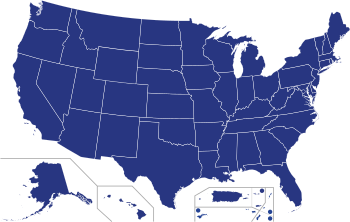| ||||||||||||||||||||||
2,550 delegate votes (2,443 pledged and 107 unpledged) to the Republican National Convention[1] 1,276[1] delegates votes needed to win | ||||||||||||||||||||||
|---|---|---|---|---|---|---|---|---|---|---|---|---|---|---|---|---|---|---|---|---|---|---|
| ||||||||||||||||||||||
 First place by first-instance vote
| ||||||||||||||||||||||
| ||||||||||||||||||||||
| Attempts to overturn | |
|---|---|
| Democratic Party | |
| Republican Party | |
| Third parties | |
| Related races | |
| |
Presidential primaries and caucuses of the Republican Party took place in many U.S. states, the District of Columbia, and five U.S. territories from February 3 to August 11, 2020, to elect most of the 2,550 delegates to send to the Republican National Convention. Delegates to the national convention in other states were elected by the respective state party organizations. The delegates to the national convention voted on the first ballot to select Donald Trump as the Republican Party's nominee for president of the United States in the 2020 election, and selected Mike Pence as the vice-presidential nominee.
President Donald Trump informally launched his bid for reelection on February 18, 2017. He launched his reelection campaign earlier in his presidency than any of his predecessors did. He was followed by former governor of Massachusetts Bill Weld, who announced his campaign on April 15, 2019, and former Illinois congressman Joe Walsh, who declared his candidacy on August 25, 2019. Former governor of South Carolina and U.S. representative Mark Sanford launched a primary challenge on September 8, 2019. In addition, businessman Rocky De La Fuente entered the race on May 16, 2019, but was not widely recognized as a major candidate.
In February 2019, the Republican National Committee voted to provide undivided support to Trump.[5][6] Several states canceled their primaries and caucuses.[7] Other states were encouraged to use "winner-takes-all" or "winner-takes-most" systems to award delegates instead of using proportional allocation.[8][9]
Trump became the presumptive Republican presidential nominee on March 17, 2020, after securing a majority of pledged delegates.[10] Donald Trump received over 18 million votes in the Republican primary, the most ever for an incumbent president in a primary as well as the most for any Republican in a presidential primary.[citation needed]
- ^ a b c d e f "The Green Papers". Retrieved February 13, 2020.
- ^ Choi, Matthew (October 31, 2019). "Trump, a symbol of New York, is officially a Floridian now". Politico. Retrieved October 31, 2019.
- ^ Klar, Rebecca (December 12, 2019). "Hawaii GOP cancels presidential preference poll, commits delegates to Trump". The Hill.
- ^ @KansasGOP (September 6, 2019). "Information on the Kansas Republican Party's national convention delegate selection plan. #ksleg" (Tweet) – via Twitter.
- ^ Miller, Zeke (January 23, 2019). "Republican Party to Express 'Undivided Support' for Trump". Associated Press. Retrieved February 5, 2019.
- ^ Scott, Rachel (January 29, 2019). "RNC pledges support for Trump 2020; state leaders consider canceling caucuses". ABC News.
- ^ Kinnard, Meg (September 7, 2019). "Nevada, SC, Kansas GOP drop presidential nomination votes". AP News.
- ^ "Rhode Island GOP switches to "winner-take-all" primary vote". Associated Press. September 20, 2019 – via Providence Journal.
- ^ Murray, Stephanie (May 6, 2019). "Massachusetts Republicans move to protect Trump in 2020 primary". Politico.
- ^ Borenstein, Seth; Colvin, Jill (March 17, 2020). "Trump clinches GOP nomination with Tuesday primary wins". MSN News. Associated Press. Retrieved March 17, 2020.
Cite error: There are <ref group=lower-alpha> tags or {{efn}} templates on this page, but the references will not show without a {{reflist|group=lower-alpha}} template or {{notelist}} template (see the help page).

